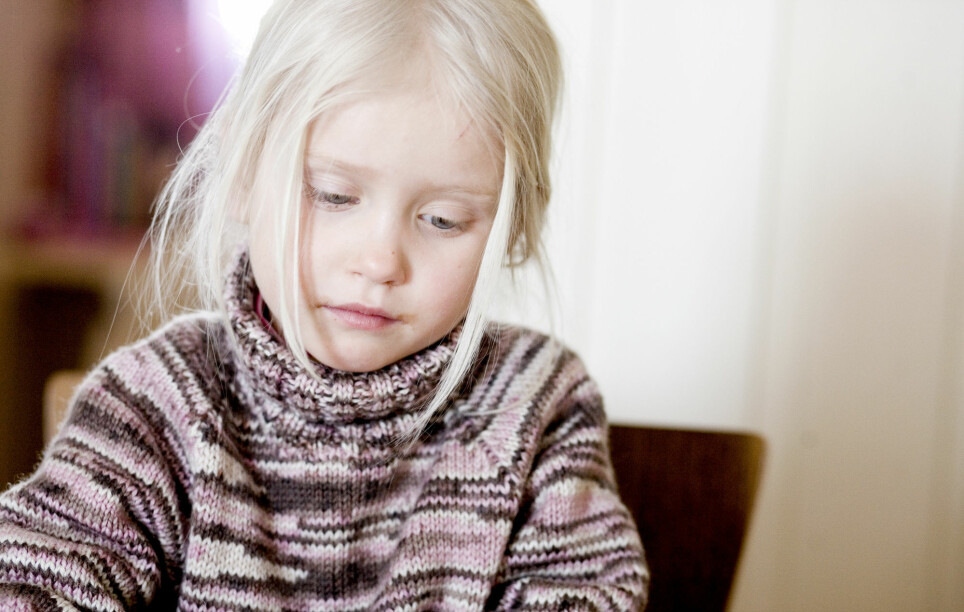
Nature or nurture? Here’s what researchers found out when they studied children with depression
Genes can affect the next generation through the environment the parents create, according to a large study of Norwegian families.
That depression can be hereditary is nothing new. But the question as to whether “nature or nurture" is the reason for a person’s characteristics has never been easy to answer.
That’s partly because our genetic heritage and childhood environment aren’t two completely separate things.
A large study of almost 12,000 Norwegian families comprised of a mother, father and children, has demonstrated this in an ingenious way.
Parents’ genes can in fact affect their children negatively — even without them having inherited them.
“If the parents' genes affect the child's depression, when we control for the child's genes, we find that the effect must take place through the environment,” says one of the researchers behind the new study, Rosa Cheesman.
The parents' genes can thus affect the environment in which the children grow up in a negative way.

Depression and anxiety in mother
The researchers behind the new genetic study have found one possible explanation for this, says Cheesman, who was the prime researcher behind the study while taking her doctorate at King's College London.
The researchers had access to questionnaires filled out by the mothers. Here they found answers as to whether the mother herself had symptoms of mental disorders.
And they found a connection.
Part of the negative effect from the parents' genes could be explained by whether the mother had symptoms of anxiety or depression.
In other words, it may be that the mother's genes helped to make her mentally ill — and that it was this that made her children depressed.
The next step is to look at the father's mental health
But Cheesman says this explanation is probably an oversimplification. The researchers didn’t have a lot information about the families, especially about the fathers.
“An important next step is to look at the father's mental health and other factors that can affect the environment in the family,” Cheesman said.
Now she has come to Norway to do more research on these families at the Promenta Research Centre at the University of Oslo.
Not deterministic
Does this mean that parents who have certain types of genes are destined to make their children depressed?
“No, it’s not deterministic. It’s not certain that if you have these genes, you’ll have this kind of parenting style,” says Cheesman.
She thinks the study may be reassuring for some parents. The conclusion is that there is no simple explanation for why some children become depressed.
“Both genes and the environment have a say. If you are afraid that you are having a bad influence on your child as a parent, it’s never just that. And if you're afraid about the genes your child has inherited from you, it's never just that, either. The environment means a lot, and you can influence that,” she said.
Worried children affect their parents
There’s also nothing new about the knowledge that genes can affect the family environment, says Cheesman. The genetics of both parents and children can affect family dynamics.
For example, children who are genetically predisposed to anxiety can influence their parents to behave differently, she says.
“Anxious children can behave in such a way that parents become more protective and create more structure around the child,” she said.
Genetic research has also shown that some of the parents' genes are related to how much education their children receive — even though the children have not inherited these genes.
In this previous study, it seemed that the genes helped to shape the environment the parent created for the children, and that this in turn affected the children's own level of education.
Not entirely revolutionary
That’s why Cheesman was not very surprised by the findings of the new study.
“Our main discovery isn’t completely revolutionary, because we already knew the environment was important,” she says.
Researchers have known this long before they could decode people's genes.
Because there is another method that can be used to measure how much is due to heredity or environment: twin studies.
Used the relationship between the participants
To make comparisons to traditional methods, the British and Norwegian researchers also calculated heredity in a different way.
They then used a method similar to twin studies — only without twins.
Using information about kinship between parents, siblings and cousins, they were able to calculate the relationship between heredity and environment.
Using this method, they found that depression was 37 per cent hereditary. This is almost twice as large a number as they calculated when they studied the genes of the families.
However, which number is closest to the truth is difficult to say, according to Cheesman. None of the methods are perfect.
So there is still no simple answer to whether depression is a result of "nature or nurture”.
Differs from twin studies
The thing that’s really great about studying twins is their genetics.
Identical twins are genetically identical, while fraternal twins only share half of their genes, like all other siblings.
So if our genes have a say as to whether we get a disease or not, twin studies can tell us the answer.
Identical twins will simply more often have the same disease status than fraternal twins, if the disease is hereditary.
Many possible explanations
Researcher Helga Ask at the Norwegian Institute of Public Health has also been involved in mental health studies related to the Norwegian Mother, Father and Child Cohort Study. She was not involved in the new study.
She believes it’s simply not possible to conclude how a parents' genes affect their children's environment, based on this study.
“Although this study shows that there is an indirect effect of the parents' genes on the child, which explains 14 per cent of the child's depressive symptoms, we still don’t know anything about mechanisms. To find out more, we also have to add more yardsticks, such as parenting style,” Ask wrote in an email to sciencenorway.no.
To get closer to the real cause, it’s also important to include information about other factors that can affect children, she said, such as where they live and how strong the family’s finances are.
Difficult to calculate heredity
Ask also points out that some of the results from this study differ from numbers reported in classic twin studies.
The researchers found that depression was 19 per cent hereditary, in the case of classic heredity. This means that the children have inherited certain genes from the parents, which can make them predisposed to become depressed.
This number is lower than what has been reported in twin studies, according to Ask.
Translated by Nancy Bazilchuk
Reference:
Rosa Cheesman et.al.: How important are parents in the development of child anxiety and depression? A genomic analysis of parent-offspring trios in the Norwegian Mother Father and Child Cohort Study (MoBa), BMC Medicine, 2020.
———
Read the Norwegian version of this article at forskning.no
































